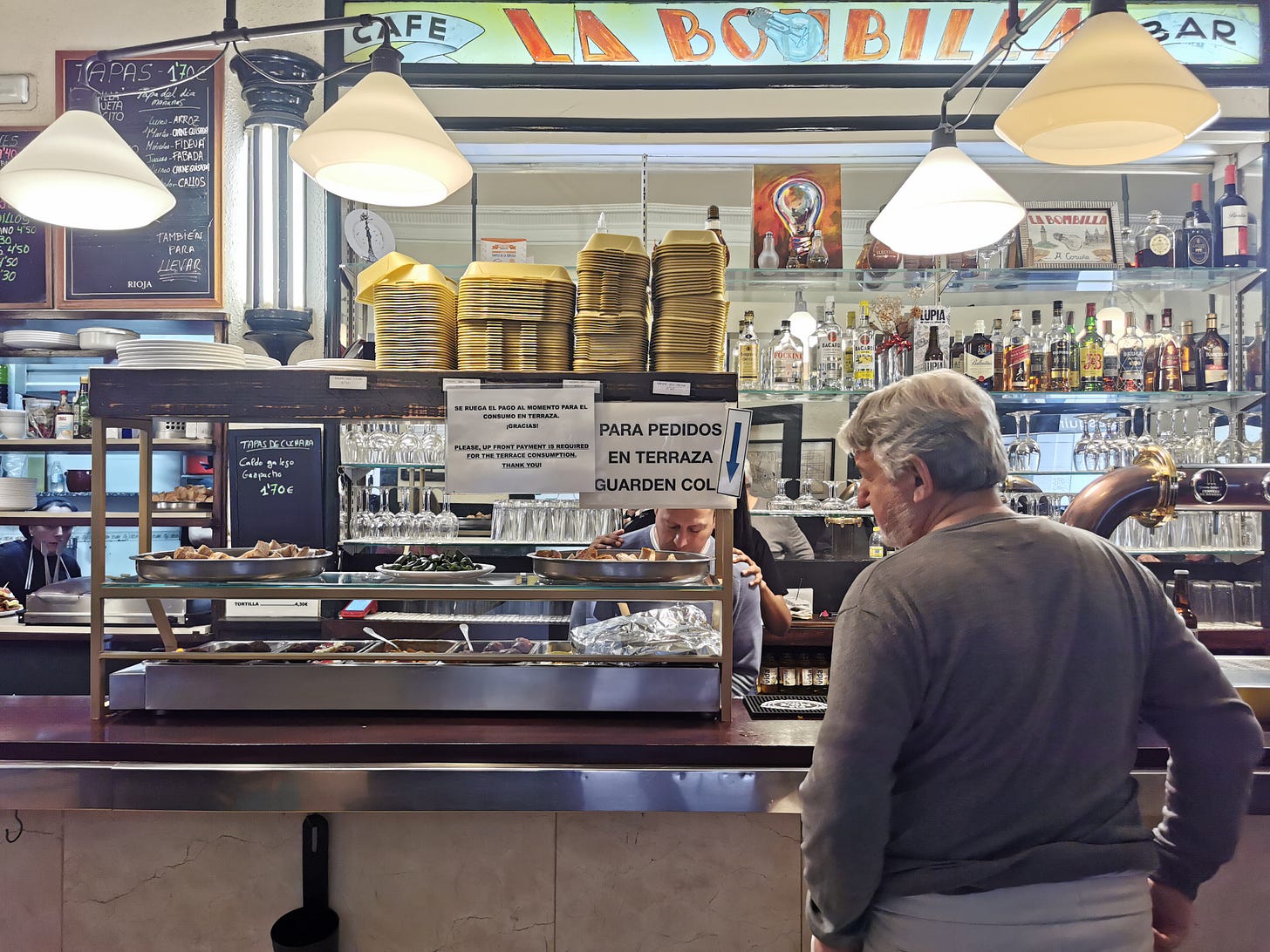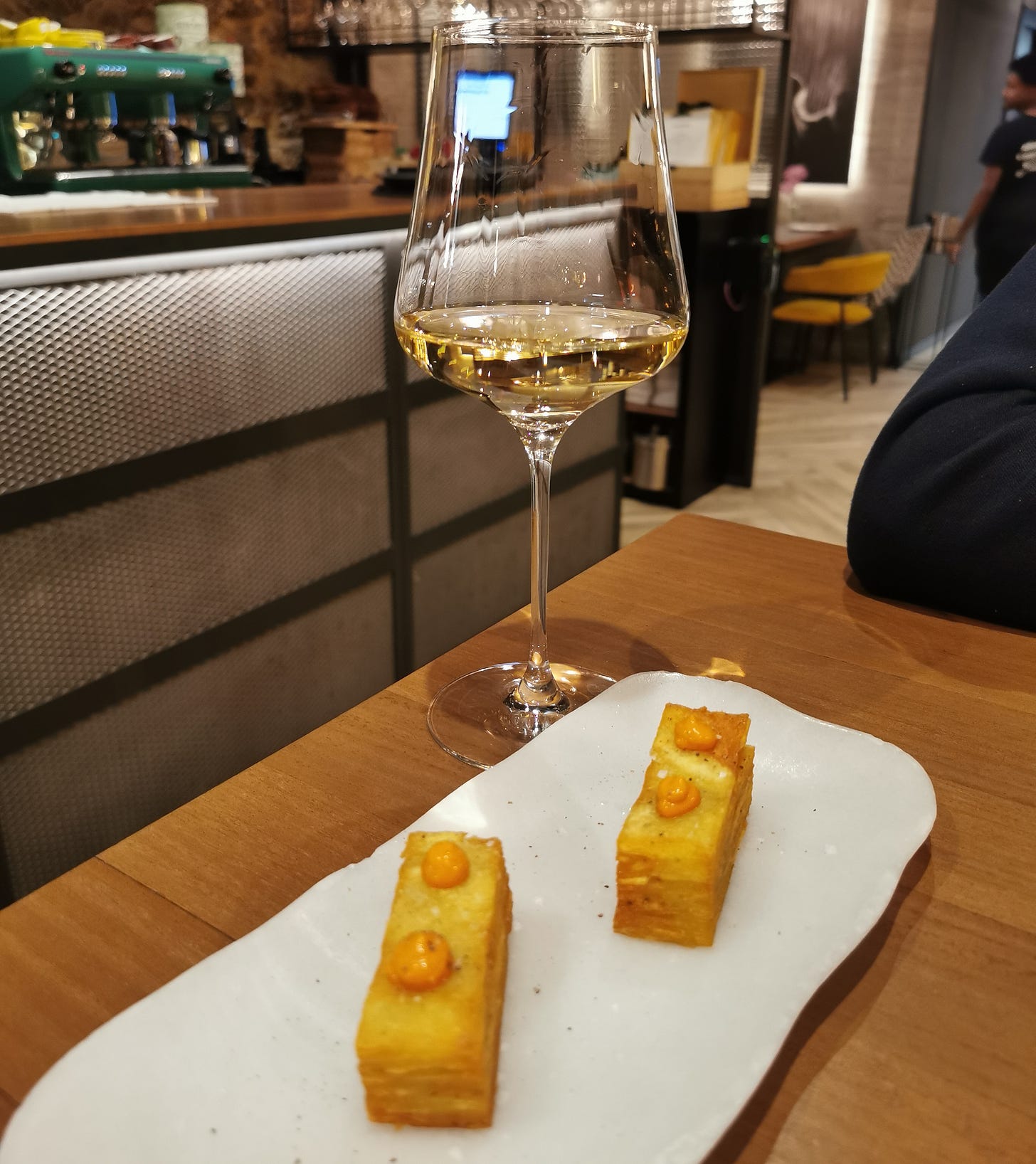What the Galician city of A Coruña made me think about Spanish wine and food culture
And not for the first time
I would forgive you if, when I say A Coruña, you say where?
A Coruña is a small city perched on the tip of a peninsular in Galicia, northwest Spain.
Galicia has an interesting reputation on the world tourism stage. Few people I know — outside of Portugal and Spain at least — know it even exists. Or they’ve only heard about it because of Santiago de Compostela, the finish line of the Camino de Santiago.
Put it this way, there aren’t many package holidays to Galicia like there are to Malaga, Benidorm, or Marbella.
I suspect part of this is because of the weather. This is a windswept, verdant, part of Spain. It rains here 25% more than it did where I lived in the UK (seriously). It’s cold. Sea temperatures, like much of the Atlantic coast, never rise very high, even in the height of summer.
But talk to anyone who has made the trip to Galicia and watch them get misty-eyed. They’ll probably tell you about the food they ate, the wild sea they saw, the amazing wine they drank, the impossibly steep valleys they photographed.
This is a very special part of the world, made even more so by its dedication to food, wine, and culture.
Happily for me, A Coruña — one of my favourite cities in Galicia — is only three hours by car from where I live in Porto. So this weekend I took yet another trip up there. Partly because my body and mind needed respite like only Galicia can give, and partly because I want to write about this special city.
I’m working on another in-depth food and wine guide to A Coruña which will join the ranks of Rome, Logroño, Porto, San Sebastian, and Jerez. In the meantime, here’s what A Coruña made me think — and not for the first time — about what Spain does so well when it comes to food and drink.
It’s a cliché, but old-school tapas bars are not just a place to eat and drink, they a way of life. I adore that, despite Spain being incredibly diverse across regions, almost all old-school tapas bars have a similar way of doing things.
Cold snacks sit under glass on the counter. Hot food comes from tiny back kitchens. Order what you want at the bar, don’t forget the caña of beer or small copa of wine. Stand at the bar or perch along the side. People watch — there’s nothing like it in these bars. Don’t worry about your age, you’ll probably never be the oldest or the youngest. Pay at the counter, be prepared to recount what you had. Repeat ad infinitum along the street. Or at least until bed beckons.
Speaking of tapas, A Coruña is a free tapas town. I’ve not come across such dedication to the free tapa since I visited Granada and it is certainly not the norm in all of Spain. But in A Coruña, nearly every drink came with something snacky. It could be as small as a bowl of olives or as elaborate as mille feuille potatoes.
The free tapa is a reminder that your drink should always come with a snack, wherever you live.
If you don’t like tripe, don’t visit A Coruña on a Saturday. Every day here is assigned a certain dish. On that day, you’ll find it served across the city either as a free tapa or as a special. Saturday for instance is callos — tripe stew — day. Thursday is fabada day (a bean and cured meat stew from Asturias) and so on.
There is something very comforting about knowing a whole city is eating the same dish on the same day. Much like fish on Friday in the UK or Bacalhau on Sunday in Portugal, partaking in it feels like belonging. Even as a tourist.
In-it-for-life hospitality is alive and kicking and living in Spain. I’m a firm believer that hospitality is a viable lifelong career and shouldn’t only be considered a stop-gap job for students or people struggling to find work elsewhere. Spain is living proof of this.
As with many other Spanish cities, in A Coruña I was often served by the same folks in the bars and restaurants as my last visit. Often these are older guys who have been working the same bar for years. They are lifers and have skills only lifers possess. An efficiency that only comes from knowing a job back to front. An inhuman skill of remembering everything you order. What appears to be a genuine love for the job.
Hospitality is a worthwhile career. These guys are a reminder of that.
Eating standing up is an art form. It’s not easy to eat soup standing up, let me tell you. Finding room in a busy bar is also not a small feat if you’re not used to it. But they make it work in Spain.
Eating standing up for a whole evening is also not for the faint of heart. There is a dedication needed for three or four hours of it. I’m always amazed how many older folks manage it, and make it look effortless to boot. Mind you, if you’ve been doing it your whole life…
Spain takes crisps (potato chips) very seriously. And the best are from A Coruña. Many people assume that Spanish churrerias only sell churros when they are actually fried goods specialists. Yes, that often includes churros but also crisps.
There is nothing quite like picking up crisps from a churreria — they beat Lays every day of the week.
I didn’t know this until the weekend, but A Coruña happens to be home to one of the best crisp brands in the world (in my opinion at least), Bonilla a la Vista. If you’ve ever visited Spain you may already know the distinctive blue and white packaging with the little boat. They’ve attained an almost cult-like following in other countries too. If you get served Bonilla crisps in London for instance, you know you’re in a joint that takes food seriously.
Not everywhere in Spain is expensive (yet). I expected a city like A Coruña to be more expensive than it is. It’s a rather well-heeled town. It’s got quality restaurants and bars. It’s also got some serious industry kudos, being the home of Inditex, the clothing retail company which owns Zara, Pull & Bear, Massimo Dutti and more.
Yet it’s still very good value. Not only in real estate (let’s leave homes for those who live there) but in the bars and restaurants too. Very —and I mean very — good wines by the glass were about half what I expected to pay, and would pay here in Porto. The seafood was affordable (never a given, even in a seafood town). There was an informal cartel on tapas prices in the traditional bars at €1.70 a pop.
In fact, one of the most interesting conversations I had was with a worker at a coffee shop who told me he used to live in Portugal but returned home because A Coruña was so much cheaper.
A Coruña is the perfect example of Spain having the best wine scene in the world. This is a small-ish city on the periphery of a winemaking region so I expected plenty of Galician wines and happily, I found them. BUT I also found excellent wines from across the world. I drank fantastic wines from France, Germany and Italy at prices I can barely find wholesale back home.
This is what I love about Spain. The prices for quality wines are sometimes so low, you think they’ve made a mistake. Not only that, but they have wine representation from around the world and the confidence to put their bottles alongside the best of the best.
Finally, you could live very well in A Coruña. Hopefully one day, I might.











I love the idea of each day of the week having it's own specific tapa! Also, I'm in Portugal right now, so I will remember to (only) eat Bacalhau on Sunday. Thank you for teaching me my "something new" today!
Can’t disagree. Blew into a coruna for 3 nights in October last. Well worth a longer stay.